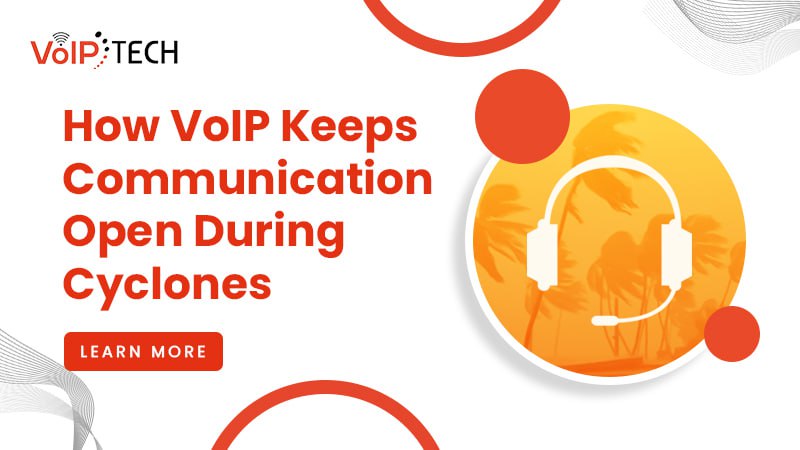How VoIP Keeps Communication Open During Cyclones

When natural disasters like cyclones strike, effective
communication can be a lifeline. In such chaotic times, traditional phone lines
may falter due to damaged infrastructure or overloaded networks. This is where
Voice over Internet Protocol (VoIP) services come into play, ensuring that
individuals and businesses remain connected even in the face of adversity.
Here’s how VoIP technology helps keep communication channels open during
cyclones.
1.
Network Resilience
One of the key advantages of VoIP is its reliance on internet connectivity
rather than traditional phone lines. Most VoIP systems operate through the
internet, which can often remain functional even when conventional networks go
down. As long as there’s access to a Wi-Fi connection or mobile data, users can
make calls and send messages, maintaining essential lines of communication.
2.
Portability and Flexibility
VoIP services are highly portable, allowing users to make and receive calls
from various devices, including smartphones, laptops, and tablets. During
a cyclone, people may need to evacuate or relocate, but as long as they have an
internet connection, they can stay connected with loved ones and emergency
services. This flexibility enables quick communication, which is vital in
emergencies.
3.
Cost-Effectiveness
After a disaster, it is essential to manage costs effectively. VoIP
services often come with lower call rates compared to traditional phone
systems, especially for long-distance calls. This cost-effectiveness allows
families and businesses to stay in touch without worrying about high bills,
which can be especially beneficial during crises when financial resources may
be strained.
4.
Unified Communication Tools
Numerous VoIP providers offer a range of integrated communication tools, such
as video conferencing, instant messaging, and email services. These tools
can be invaluable during cyclones, enabling families and organizations to
coordinate response efforts, share updates, and ensure everyone is safe. The
ability to use multiple communication formats enhances the likelihood of
reaching someone during an emergency.
5. Emergency Alerts and Notifications
VoIP systems can be set up to deliver emergency alerts and notifications
directly to users. This feature is essential during natural disasters when
timely information is crucial. Businesses can communicate important updates to
employees, while families can ensure that everyone stays informed about
evacuation orders or safety measures.
6. Scalability for Businesses
For businesses, the ability to scale communication solutions quickly can make a
significant difference during a cyclone. VoIP systems can be easily adjusted to
accommodate fluctuating needs, such as increased call volume from customers
seeking assistance. This scalability helps businesses maintain customer service
and support even in challenging situations.
7. Backup Power Solutions
Many VoIP providers offer solutions that can function during power outages.
Using Uninterruptible Power Supplies (UPS) or backup generators, users can keep
their VoIP systems operational even when electricity is lost. This feature
ensures that communication remains possible when it’s needed most.
Conclusion
Effective communication is essential during cyclones and other natural
disasters. VoIP services provide a dependable, adaptable, and cost-efficient
means of staying connected when traditional phone lines may be compromised. By
utilizing the advantages of VoIP technology, families and businesses can ensure
they are informed and ready, greatly enhancing safety and coordination during
emergencies. Having a reliable VoIP system in place can be pivotal when facing
severe weather conditions.



